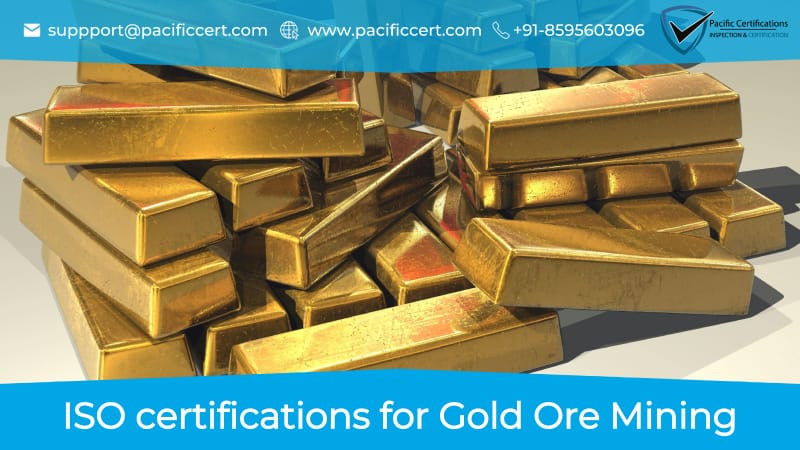ISO Certifications for Gold Ore Mining, Requirements and Benefits

Introduction
Gold ore mining remains one of the world’s most vital industries, driving economic growth and global trade. Yet, it operates under increasing scrutiny for environmental, ethical, and safety standards. As governments and investors demand transparency, sustainable operations, and regulatory compliance, ISO certifications have become essential tools for gold mining companies to demonstrate responsible governance, risk management, and operational excellence.

According to the World Gold Council, global mine production reached over 3,600 tones in 2024, with significant expansion projected in Africa, Australia, and Latin America. The sector is adapting to ESG (Environmental, Social, and Governance) pressures, digital mine automation, and evolving supply chain traceability expectations. ISO certification allows gold mining operations to align with global standards for environmental protection, worker safety, quality control, and energy efficiency, ensuring that mining activities contribute to long-term economic and ecological sustainability.
Responsible gold mining is not just about extraction — it’s about managing people, environment, and resources with integrity and precision
Quick Summary
ISO certification provides gold mining companies with structured frameworks to manage environmental risks, ensure workforce safety, and maintain quality and ethical governance. In an industry increasingly driven by sustainability, compliance, and transparency, certification is a strategic investment that supports long-term operational credibility and global market access.
Applicable ISO Standards for Gold Ore Mining Companies
ISO Standard | Focus Area | Relevance to Gold Mining |
|---|---|---|
ISO 9001:2015 | Quality Management | Ensures consistent control of mining, processing, and refining operations. |
ISO 14001:2015 | Environmental Management | Reduces environmental impact from extraction, waste disposal, and tailings management. |
ISO 45001:2018 | Occupational Health & Safety | Protects workers from hazards such as blasting, dust exposure, and heavy machinery use. |
ISO 50001:2018 | Energy Management | Improves energy efficiency in crushing, grinding, and processing operations. |
ISO 26000:2010 | Social Responsibility | Guides ethical labor practices, community relations, and human rights considerations. |
ISO 14064:2018 | Greenhouse Gas Accounting | Measures and verifies emissions, supporting sustainability and carbon neutrality goals. |
ISO 22301:2019 | Business Continuity | Ensures critical mining operations remain functional during disruptions such as strikes or equipment failures. |
ISO 9001:2015 - Quality Management Systems:
Specifies requirements for a quality management system (QMS). Gold ore mining companies can use it to ensure that they meet customer and regulatory requirements and continuously improve their processes.
ISO 14001:2015 - Environmental Management Systems:
Provides a framework for environmental management best practices. It helps mining companies minimize their environmental footprint, comply with legal requirements, and achieve sustainability goals.
ISO 45001:2018 - Occupational Health and Safety Management Systems:
Outlines the requirements for an occupational health and safety (OH&S) management system, helping organizations improve employee safety, reduce workplace risks, and create safer working conditions.
ISO 50001:2018 - Energy Management Systems:
ISO 50001 supports organizations in all sectors, including gold ore mining, to use energy more efficiently through the development of an energy management system (EnMS).
ISO 14064 - Greenhouse Gases:
Provides guidance at the organization level for the quantification and reporting of greenhouse gas (GHG) emissions and removals. It is essential for mining companies to manage and report their GHG emissions accurately.
Click here to find out more applicable standards to your industry
Contact us today at [email protected] to get your certification process started!
What are the requirements of ISO certifications for Gold Ore Mining Services?
Gold mining companies must implement integrated management systems that govern safety, quality, environmental protection, and sustainability across exploration, extraction, and processing activities. Below are the the key general and standard specific requirements:
- Define certification scope, including exploration, ore extraction, beneficiation, smelting, or refining stages.
- Develop written policies for quality assurance, environmental management, occupational safety, and community engagement.
- Conduct environmental impact assessments and maintain waste and water management controls for tailings, effluents, and emissions.
- Identify workplace hazards, assess risks, and implement safety programs for blasting, drilling, and chemical handling.
- Monitor process efficiency, product recovery rates, and equipment maintenance for consistent quality output.
- Establish energy-monitoring systems for diesel, electricity, and water use to identify conservation opportunities.
- Train workers on safety protocols, PPE usage, emergency response, and environmental awareness.
- Implement procedures for stakeholder communication, grievance handling, and compliance with local mining regulations.
- Perform internal audits, management reviews, and continuous improvement programs to evaluate system performance.
- Maintain records of emissions, waste reduction, and community development initiatives to demonstrate sustainability performance.
Specific requirements:
ISO 9001:2015 - Quality Management Systems Requirements:
- Understand the internal and external issues, needs, and expectations of interested parties.
- Establish a quality policy and ensure active leadership and commitment.
- Identify and address risks and opportunities, establish quality objectives, and plan changes.
- Manage resources, including human resources and infrastructure, and ensure competence, awareness, and communication.
- Plan, control, and manage operational processes.
- Monitor, measure, analyze, and evaluate the quality management system's performance.
- Identify non-conformities and implement corrective actions.
ISO 14001:2015 - Environmental Management Systems Requirements:
- Develop a policy that includes commitments to compliance, prevention of pollution, and continual improvement.
- Identify environmental aspects, compliance obligations, and risks and opportunities.
- Ensure resources, competence, awareness, and communication to support the EMS.
- Plan and control operations to mitigate significant environmental aspects.
- Monitor, measure, analyze, and evaluate environmental performance.
- Continually improve the EMS and address non-conformities.
ISO 45001:2018 - Occupational Health and Safety Management Systems Requirements:
- Engage top management and workers in OH&S management.
- Identify hazards, assess risks, and determine legal and other requirements.
- Allocate resources, ensure competence, and establish communication mechanisms.
- Implement controls to manage OH&S risks.
- Monitor, measure, and evaluate OH&S performance.
- Address non-conformities and continually improve OH&S performance.
ISO 50001:2018 - Energy Management Systems Requirements:
- Develop a policy that includes commitments to energy performance improvement.
- Conduct an energy review, establish an energy baseline, and set energy objectives and targets.
- Ensure resources, competence, awareness, and communication for EnMS.
- Implement action plans to achieve energy objectives.
- Monitor, measure, analyze, and evaluate energy performance.
- Continually improve the EnMS and energy performance.
Tip: Start certification with ISO 14001 and ISO 45001 to build strong environmental and safety management foundations before integrating ISO 9001 and ISO 50001 for efficiency and quality control.
What are the benefits of ISO Certification for Gold Ore Mining Services?
ISO certifications provide gold ore mining companies with a robust framework for managing quality, environmental, health, safety, and energy performance.
Here are some common benefits:
- It establishes formal control systems that reduce accidents, waste, and production variability.
- Certification enhances compliance with national and international mining regulations and investor ESG requirements.
- Environmental management helps minimize pollution, manage tailings responsibly, and preserve local ecosystems.
- Energy management lowers operational costs by optimizing fuel, power, and water use.
- Certified safety frameworks reduce workplace incidents and improve employee morale and retention.
- Documented systems support transparency, attracting investors and meeting due diligence standards for responsible gold sourcing.
- Certification improves supply chain traceability, ensuring gold meets ethical sourcing criteria (e.g., LBMA Responsible Gold Guidance).
- Integrated systems promote long-term sustainability, helping companies align with SDG (Sustainable Development Goals) targets.
The global gold mining industry is experiencing a shift toward responsible and low-impact operations. According to Allied Market Research, the market for sustainable mining solutions is projected to grow at 7.2% CAGR through 2030, driven by environmental regulations and corporate responsibility frameworks. Investors are increasingly linking funding to ISO-certified operations that can verify sustainability and ESG performance.
Automation and digitalization — including smart drilling systems, AI-based ore analysis, and predictive maintenance — are transforming mine efficiency but require structured management systems to ensure quality and safety. With governments enforcing stricter emission and water discharge limits, ISO 14001 and ISO 50001 have become key benchmarks. Between 2025 and 2030, certified mines are expected to outperform non-certified competitors in operational efficiency, regulatory compliance, and investor confidence.
How Pacific Certifications Can Help
Pacific Certifications, accredited by ABIS, provides impartial auditing and certification services for gold mining companies under ISO/IEC 17021 and ISO/IEC 17024 frameworks. We certify organizations to standards such as ISO 9001, ISO 14001, ISO 45001, ISO 50001, ISO 22301, and ISO 26000, ensuring compliance with international mining and sustainability requirements.
Our auditors assess system effectiveness, risk control, and performance improvement while maintaining full independence. We also deliver accredited training programs, including Lead Auditor, Internal Auditor, and Awareness courses, to support internal capacity building within mining organizations.
If you need support with ISO certification for your Gold Ore Mining business, please contact us at [email protected] or +91-8595603096.
Ready to get ISO certified?
Contact Pacific Certifications to begin your certification journey today!
Written by: Pushpinder Kaur
Suggested Certifications:
Read more: Pacific Blogs

